There’s a big difference between a bassist’s record and a “bass record”
By Jon Liebman
Week of November 9, 2020
Do you like bass records?
(Neither do I.)
As the number of bass player interviews I’ve conducted approaches 700, I can’t tell you how many bassists have told me, “I want to make a solo album, but it’s not going to be ‘one of those bass records.’ I hate bass records!”
Back in the ‘70s, when Stanley Clarke, Alphonso Johnson, and of course, Jaco Pastorius released their solo records, I was all over them. When the concept of a bass record first hit me, a “Hey, I didn’t know we could do that!” feeling had come over me.
Then came the ‘80s, the ‘90s, and beyond, and an onslaught of chops-infused, slap-laden “bass records” that, frankly, test the patience of even the biggest bass geeks.
There is an art to getting it right, however.
I recently conducted a great interview with Gwen Stefani/Shania Twain bassist Derek Frank, who just released a killer solo record. Derek’s got plenty of facility on the bass. He could have made a “bass record,” but he chose to go a different route.
“I didn’t want to do a bass album,” Derek says, “because first of all, I’m not really that kind of player. I’m a group player with some solo chops, but I’m not one of those ripping solo guys.”
Perhaps being a bit modest, Derek still makes a good point. When learning bass, what’s more important than anything is understanding the role of the bass player, which is to set the foundation for the band, lay down a solid groove, and make the music feel good. If, in the process, the music genuinely needs a few sections with some heavy duty bass chops, so be it. But nobody wants to listen to a 50-minute bass solo, no matter how much you’re into bass.
“There are so many guys out there that do that way better than I do,” Derek says, “so I didn’t want that to be the vibe of the record. Plus, I feel like when you’re doing that, you’re really narrowing down your audience. There are very few people that are into that kind of stuff.”
There’s a time and a place for everything, including big-time bass chops. It all comes down to how you approach the bass and how you choose to interact with the other musicians in the band. If you’ve got to be the center of attention, or if you have something you’ve got to get out by way of a “bass record,” then go for it. Just be sure you understand what you’re getting yourself into, and know that that kind of approach is not likely to endear you to music makers in search of a groove-making bass player.
“I honestly don’t listen to a lot of those records,” Derek continues. “It’s just not really what turns me on. What turns me on musically is just fat tone, fat groove, good interaction between players and just — yeah, taste!”
Bass records have their place. Just don’t forget, first and foremost, we’re here to groove.
How about you? Have a thought on the subject? Leave a comment below and let me know what you think. In the meantime, check out my interview with Derek here.
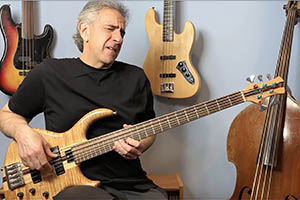
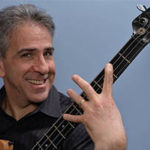
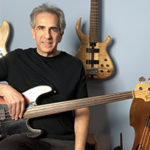
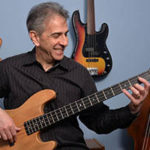
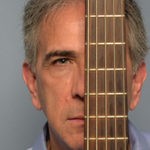

A person travels to a foreign country. At the airport he hears drums in the distance; he asks the airport security guy, “What’s with the drum sounds?” The guy answers, “The drums must never stop. Very bad if drums stop playing.” Before the tourist can ask why the drums must never stop, he hurries to a taxi. The drum sounds continue. He asks the taxi driver, “What’s with the drum sounds?” The guy answers, “The drums must never stop. Very bad if they stop.” Before the tourist can ask – again – why the drums must never stop, he is hustled into his hotel. He’s getting frustrated! He decides to go to the hotel concierge, and says, “Look. You hear those drums? Why are they supposed to never stop?” The concierge says, “Because if the drums stop, the bass solo starts!”
Having an opportunity to play different periods of music
and different genres is invaluable.
I love those chops records. (As I called them) But I want to hear the compositional side as well; how you play well with other players, letting someone else take the melody i.e sax, guitar, horn, or even vocals. You don’t have to put a bass solo on every track. Show your compositional side as well. I love em both! I don’t EVER get tired of hearing bass records. Just add more variety, that’s all.
Mark Egan is the epitome of a bass record,the bass is prominent in the mix,its a BASS RECORD! it pisses me off when a big name bassist releases an album and sax or keyboards are the featured instruments
The reason for any instrumentalist to do their own CD is to feature their music, and/or their instrumental skills whether sectional or improvisational and/or their arranging/orchestration/composition skills or any/all of these and more. If not writing their own music, then they should own the arrangement(s), make the CD something unique, otherwise, all anyone is doing by playing other people’s music is cloning someone else’s ideas.
If there are solos, my take is to make them as valid as any horn solo, that is, make them musical. If not, get someone else to do it. Shine where you shine not where you do not.
I do not find any detriment in any soloists CD if they do things they always wanted to and do art for art’s sake no matter the direction they choose. If regurgitation is all that is occurring, then they may as well scrap the idea and play on someone else’s CD. If a person is making it for recognition then it’s not selfless and they may as well do a pop album because it’s not for art. You do not make instrumental or jazz CD’s to make money, so do it for the art, whatever path, sectional/soloist/composer all of them, that anyone chooses to take.